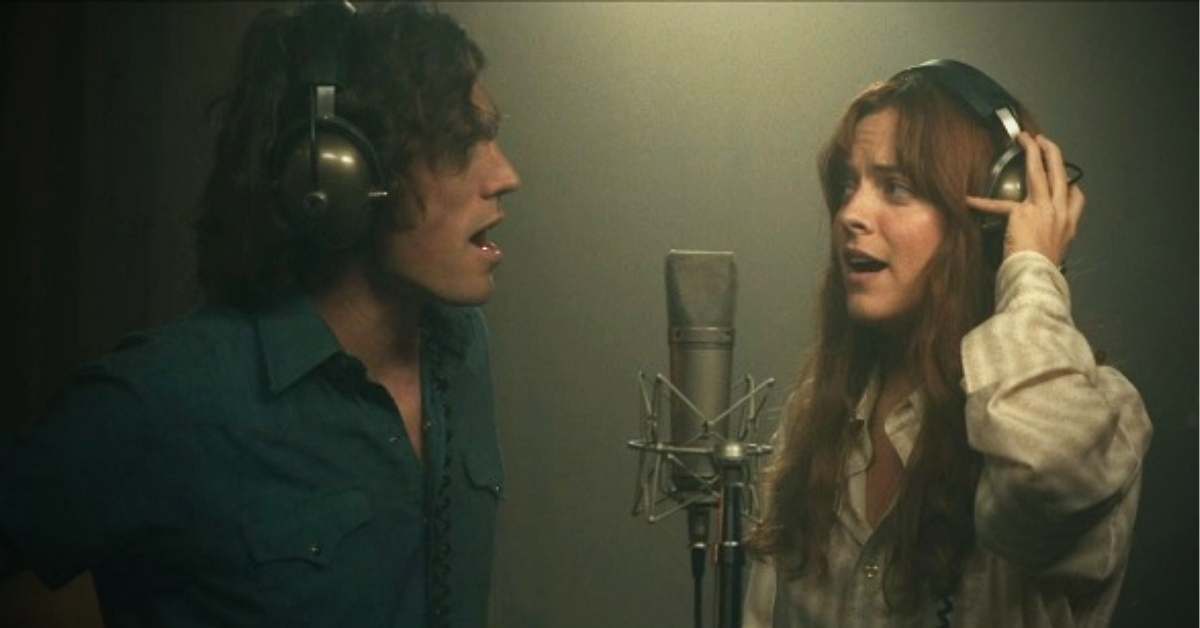In the third episode of the Prime Video drama, “Look at Us Now (Honeycomb),” the two lead singers of Daisy Jones & the Six finally meet and record their first duet together.
In fact, the moment between Daisy (Riley Keough) and Billy (Sam Claflin) is so special that the author Taylor Jenkins Reid, whose book the series is based on, says that what she wrote can’t compare to what’s happening on screen between Daisy (Riley Keough) and Billy (Sam Claflin).
Reid tells TVLine –
“I will tell you, with no caveats whatsoever, the moment for me where I watched it and thought, ‘This moment is better than anything that I could do on the pages of a book,’ is when Billy and Daisy record ‘Look at Us Now.’”
“I never could’ve captured on the page what they do in that scene. That is one of the glories of an adaptation is that you have actors like that, making something just electric, and there’s no way that I could write it that would do what they were able to do and make it look so effortless.”
The scene also shows a big difference from Reid’s book: the lyrics to the song, which is just called “Honeycomb” in the book, are different from what the oral history in the book talks about.
Also, the show changes the tracklist for the hit album Aurora by Daisy Jones and the Six, which has new songs that aren’t in Reid’s story.
We’ve also got details on a bunch of other shows that you might like. Consequently, if you find that this is something that might be of interest to you, you can peruse our coverage:
- Who is Jack Crusher and How He Appeared in Picard Season 3?
- In “The Last of Us” a Devilish Cult Leader and Cannibal is Introduced.
Reid wrote the lyrics for her version of the Aurora album, which you can find here. However, she was more than happy for seasoned musicians to write the show’s music. Grammy winner Blake Mills wrote or co-wrote and produced 25 original songs for the series.
He worked with musicians/songwriters Marcus Mumford, Phoebe Bridgers, Jackson Browne, and Taylor Goldsmith, among others, to write catchy hits, many of which are performed by Keough and Claflin.
Reid shares –
“I was very excited about the opportunity to write lyrics [for the book], but they don’t function as songs.”
“They function, if anything, as a puzzle for you to solve. There are clues within those lyrics. They are a conversation between me and the reader to try to understand what actually happened and whose version of things do you believe.”
“I just can’t conceive of going to Jackson Browne and saying, ‘Hey, write a song, but use these lyrics that she made up.’”
“It’s like, no, take whatever Jackson Browne wants to give you. Let Marcus Mumford come in and write his own song. He’s going to do it better than I did. I’m an author, I’m not a songwriter. We can get into a comparison, but I think it’s a waste of time. They’re gifts, these songs.”
Co-showrunner Scott Neustadter says that even though the words are different, the tracks still do the same thing as they did in the book. Neustadter says –
“Fans can rest assured that even these songwriters were told, ‘This is the kind of song… This is what the song needs to do in the show.’”
“The songs are telling the story in most of these scenes, so they had to work in the exact same way that they work in the novel. I would say ‘Regret Me’ and ‘Honeycomb,’ when you see the way they’re done in the show, you’ll also, I think, appreciate that it’s Taylor’s story, just with the different song lyrics.”
For Reid, hearing the fictional band come to life four years after her book was first published in 2019 was “incredible,” the author raves, “especially because people have asked me, for a really long time, ‘What do they sound like?’ and I have just sort of shuffled my feet and not answered because I didn’t know. I’m not a musician. So hearing the songs was incredible.”
Reid continues –
“I’m trying to remember what was the first one that I heard.”
“I think it might have actually been ‘Aurora,’ which is one of my favourites, and I like the way that it functions within the story. It’s a really beautiful song.”
Finally, we wrap up our coverage of “Daisy Jones & the Six” by noting that the book’s author praises the ‘electric’ and ‘honeycomb’ duet and offers an explanation for why the show’s unique setlist is a bonus.
